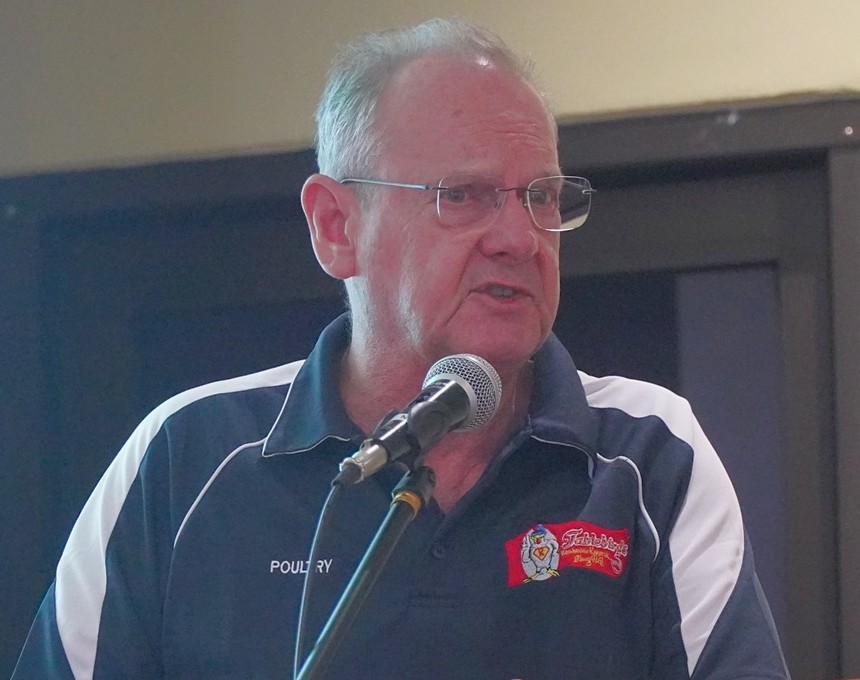Lae, Morobe Province — Friday, 11 April 2025 – Mainland Holdings Chief Executive Officer, Mr. Phil Franklin, has called for Papua New Guinea to elevate agriculture to the same level of national priority and institutional support as the mining sector.
Speaking at the National Agriculture Industry Public-Private Sector Partnership Conference in Lae—attended by Prime Minister Hon. James Marape, government officials, industry leaders, and development partners—Mr. Franklin urged the Government to apply the “mining model” to agriculture, with coordinated support across landowner relations, financing, law and order, and policy facilitation.
Mainland Holdings Ltd, headquartered in Lae, is one of Papua New Guinea’s largest and most diversified agribusinesses. The company operates across multiple sectors, including poultry production under the Tablebirds brand, stockfeed, flour milling (producing 3 Roses Flour), and crocodile farming, supplying high-quality skins to international markets and meat to local supermarkets. With a strong footprint in rural areas, Mainland Holdings plays a vital role in food security, employment, and value chain development throughout the country.
“We need to start treating agriculture like mining,” Franklin declared. “Mining projects receive structured assistance from the State—to secure leases, manage landowners, ensure law and order, and deliver tax incentives. Agriculture projects face exactly the same complexities—but they’re left to go it alone.”
He argued that agricultural enterprises, especially those in rural areas, manage land disputes, local expectations, infrastructure gaps, and security issues with far less support than their counterparts in the extractive industries. “It’s time we stop treating agriculture as a secondary industry. It’s a national economic driver—and should be supported accordingly.”

Institutional Reform Needed for Agriculture-Led Growth
Mr. Franklin proposed the creation of an agriculture-specific facilitation body—similar to mining coordinating agencies—to assist agribusinesses and farmers with land access, regulatory navigation, and community benefit-sharing arrangements.
“Land is central to every business in PNG, and agriculture is no exception. Let’s help landowners participate meaningfully and share in the benefits. An institutional vehicle to coordinate this—as exists in mining—would be a game-changer,” he said.
Private Sector Forced to Work Alone
While commending the National Agriculture Sector Plan (NASP) 2024–2033 and the Department of Agriculture and Livestock (DAL) for convening the conference, Franklin warned that poor service delivery and under-resourced agencies are obstructing investment.
“In many cases, investment promotion has turned into investment prevention,” he said. “We hear constantly about government officers not having fuel, power, or vehicles to deliver services. So the private sector is left to do everything itself.”
He stressed that agriculture does not need over-regulation, but rather enabling policies that cost little but make a big difference to producers and agribusinesses on the ground.
Protect Biosecurity Gains in Poultry Sector
Franklin praised Papua New Guinea’s strong biosecurity protections, especially for poultry, and said these must continue to be properly funded.
“There are over 10,000 SMEs raising and selling chickens—and they’re successful because our poultry is disease-free,” he explained. “They achieve commercial-level results because they’re not battling infections, thanks to our current biosecurity regime.”
He applauded Agriculture Minister Hon. John Boito for actively supporting the re-establishment of market surveillance and regulatory mechanisms and encouraged Prime Minister Marape to ensure continued funding of DAL and its biosecurity efforts.
Unlocking Solar Power Requires Policy Reform
Franklin also highlighted the untapped potential of solar power for agricultural enterprises. He said many agribusinesses want to transition to solar, especially in remote areas, but are blocked by outdated or unclear regulations.
“At the moment, policies don’t allow us to use solar legally and sustainably. These need to be revamped and fast-tracked. Solar can cut energy costs and improve productivity—but we need the green light to use it,” he said.
Stronger Dialogue Between Government and Industry
Calling for deeper public-private collaboration, Franklin said formalizing industry input into policy development at both national and subnational levels would help align planning with reality.
“Many of us in the private sector offer our time and ideas freely. The feedback we provide is based on decades of frontline experience,” he said. “What we now need is a structured, inclusive mechanism to ensure those inputs reach policymakers and decision-makers—not just in Port Moresby but at provincial and district levels too.”
Commendation for National Dialogue
Franklin concluded by praising the conference as a milestone in government-industry relations and thanked the Prime Minister and the organizing agencies for enabling such constructive engagement.
“This has been a fantastic week,” he said. “There’s nearly a thousand years of experience in this room—and if we harness that, work together, and structure our partnerships the right way, Papua New Guinea’s agriculture sector will be unstoppable.”